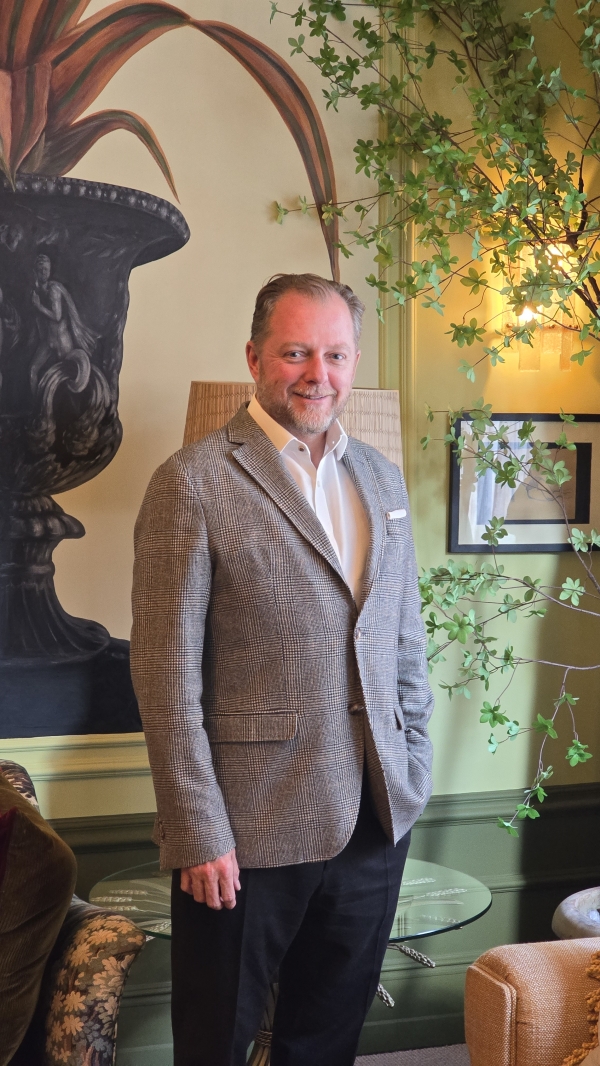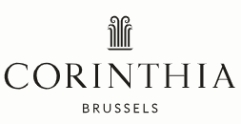Category: Europe - Belgium - Interviews and portraits
- Interviews - Industry leaders
Interview made by Sonia Taourghi on Thursday 16 October 2025
 Nicolas Kiffer officially began his role as Managing Director at Corinthia Grand Hotel Astoria Brussels on the 24th of March 2025
Photo credit © Sonia Taourghi / Journal des Palaces Meeting someone from Strasbourg and feeling immediately at home is a delightful sensation, especially in one of the eclectic and cosy lounges at Corinthia Brussels, one of Belgium's most luxurious hotels.
The Alsatian accent, his joviality and natural ease give him away: Nicolas Kipper is unmistakably a product of Alsace, despite a global career that brought him to Brussels in March 2025. This travel enthusiast began his career after studying at the Strasbourg Hotel School, driven by a clear ambition: to explore the world. His journey has taken him exclusively through the luxury and ultra-luxury sphere, particularly within the Marriott, Accor and Hyatt groups.
With seven years' experience in Istanbul and numerous international leadership roles under his belt, he was personally approached by Simon Casson, CEO of Corinthia Hotels, to head up Corinthia Brussels. His mission: to transform this iconic establishment into an actual palace hotel – the first in Belgium – offering a level of service comparable to establishments that officially bear this distinction.
How would you define your approach to luxury hospitality?
What I particularly love about this profession is never accepting the status quo. I'm constantly seeking to perfect the details, to question our practices and improve them.
Even with an exceptional product like Corinthia Brussels, I focus on enhancing the service so it's in perfect harmony with the setting. It's a thrilling challenge, because this level of luxury doesn't yet exist in Belgium.
Our ambition is clear: to reach the standard of Parisian palace hotels. I firmly believe that mastering luxury enables you to do anything, whilst the reverse isn't true.
It's this pursuit of excellence that drives me every day, along with the determination to push the teams to surpass themselves and deliver a truly exceptional experience.
What's the relationship between price and service in the ultra-luxury sector?
Clients today are prepared to pay more for an exceptional product, but they're susceptible to service. That's where true differentiation comes into play.
It's relatively straightforward to create an exceptional product – sumptuous rooms, incredibly high-quality linens – but service is far more difficult to perfect.
However, you must strike the right balance. You could charge any price, but without a clientele able to pay it, an exceptional level of service doesn't make sense.
It's this grey area that's fascinating: how far can you push service excellence whilst remaining within an acceptable price range for your target clientele? That's the art of luxury hospitality.
From your experience, what distinguishes ultra-luxury today?
Ultra-luxury is emerging today as a response to large hotel companies struggling to differentiate their luxury brands from their other brands.
These groups, like Marriott, Accor or Hyatt – which I've worked with – must standardise their offering, which complicates genuine differentiation.
True luxury, now rebranded as ultra-luxury, is the preserve of small independent companies that can add personalised touches without conforming to rigid specifications.
That's precisely what gives chains like Corinthia, Rosewood, or Mandarin Oriental their strength. We can truly make a difference by remaining in a niche of excellence, with unique establishments rather than standardised complexes.
You've moved from The Ritz-Carlton and Fairmont properties to Corinthia Brussels. What motivated you to take on this new challenge at "Brussels' Most Fabulous Address"?
It's a story of professional connections and timing. I'd known Simon Casson, our CEO, for several years. He'd already tried to recruit me twice for Four Seasons without success.
We stayed in touch and would regularly run into each other at events like ILTM in Cannes – the job centre for hotel directors!
We were already discussing another project when he simply said: "I need you in Brussels."
The rest is obvious; here I am at the helm of this gem that is Corinthia Brussels, with the ambition of making it Belgium's first Palace hotel.
As Managing Director of Corinthia Brussels, what's your strategy for recruiting and retaining exceptional talent in the competitive luxury hospitality landscape of Brussels and Europe? Have you noticed any significant changes in your recruitment approach?
Hospitality faces considerable recruitment challenges throughout the Western world. Our professions are demanding: we work when others are enjoying themselves, particularly during important moments with family and friends.
Yet hospitality maintains a warm, family-like atmosphere that's invaluable. I often observe that people who leave the sector end up coming back, because this atmosphere is difficult to find elsewhere.
To encourage retention, I ensure the executive committee and I remain visible and accessible. These small touches – remembering that an employee has just had a child or offering support during bereavement – make all the difference.
We also organise regular events: bi-monthly meetings to update the team, monthly birthday lunches... These rituals create an essential sense of belonging.
Having visited Brussels before taking up your current role, how would you characterise the distinctive qualities of Brussels' hospitality industry compared with other European capitals?
That's our greatest challenge. Brussels, despite its charms, remains a small capital that doesn't naturally attract ultra-luxury clientele like Paris or London.
Our strategy revolves around two approaches. Firstly, we're developing experiences linked to the region's cultural and sporting events: music festivals, motor racing at Spa-Francorchamps, art exhibitions, or even local craftsmanship like the tailoring tradition.
Secondly, we're leveraging our privileged geographical position at the heart of the Amsterdam-London-Paris triangle. We need to convince travellers to make a quality stopover in Brussels rather than simply passing from one capital to another.
We're also working closely with local authorities to boost Brussels' overall tourist appeal.
You've mentioned your appreciation for the friendliness of Brussels' inhabitants – how does this cultural characteristic influence the work environment you're developing at Corinthia?
Our second-largest clientele by geographical origin is Belgian, which already demonstrates our local roots. We're actively seeking to attract inhabitants from Belgium's different regions – Flanders, Wallonia – to Brussels.
We've made the strategic choice to partner with recognised local talent: Chef David Martin (one Michelin star), Chef Christophe Hardiquest (two Michelin stars) and Hannah, Belgium's finest mixologist.
This approach is doubly beneficial: it generates buzz around the hotel whilst anchoring it in Belgian gastronomic heritage.
We've also revived traditions from the old Hotel Astoria, such as Sunday classical music concerts, to reconnect with the venue's history and offer cultural continuity to Brussels' residents.
Drawing on your journey from Food and Beverage Director to Managing Director of prestigious properties, what valuable advice would you offer young professionals in luxury hospitality?
Patience is undoubtedly the most essential quality, one I didn't possess sufficiently myself early in my career. Today's young people have the same aspirations I had – such as becoming a managing director quickly – but nothing replaces experience.
The significant difference from previous generations isn't in aspirations, but in communication and instant access to information. What hasn't changed is that this profession is learnt on the ground.
Hospitality is demanding work that involves managing human beings, both on the client side and the staff side. It's not comparable to the industry where you manufacture standardised products.
Our product is never finished; it's constantly evolving: whether it's food or rooms. That's what makes this profession so fascinating, but also so complex. You must be ready to meet this daily challenge with enthusiasm and perseverance.
How do you plan to blend Corinthia's heritage with Belgian artistry to create a distinctive luxury experience?
Our ambition is to revive past splendour with modern touches. The advantage of Corinthia Brussels is that it already possesses a rich history; we don't need to invent.
We're investing considerably in our infrastructure: a fantastic spa, a gourmet restaurant led by a Michelin-starred chef, a brasserie under the direction of a two-starred chef, and a bar with exceptional mixology.
We're also working to create bespoke experiences that go beyond a simple hotel stay – "Money Can't Buy" moments, as Mastercard would say. The aim is to encourage guests to extend their stay by a day or two to enjoy these unique experiences.
We're also observing a growing trend for "staycations" – locals enjoying hotels in their own city. It's a fantastic opportunity to introduce our establishment to Brussels' residents and integrate ourselves further into the city's cultural and social fabric.
Ultimately, our mission isn't to create "magic", but to offer something exceptional: an experience that fully justifies the price paid and encourages our guests to return, whether they come from the other side of the world or the neighbouring district.
|








